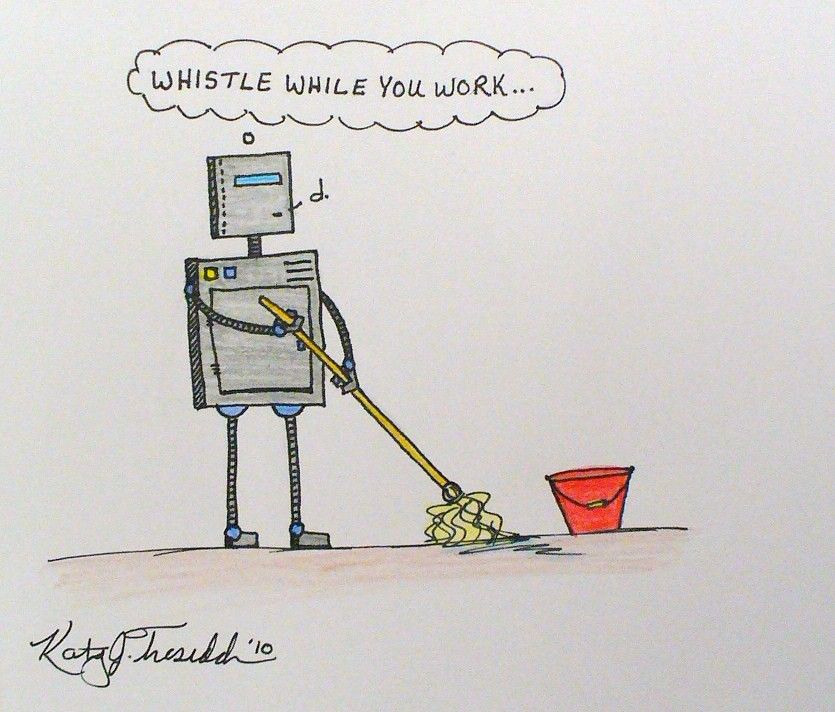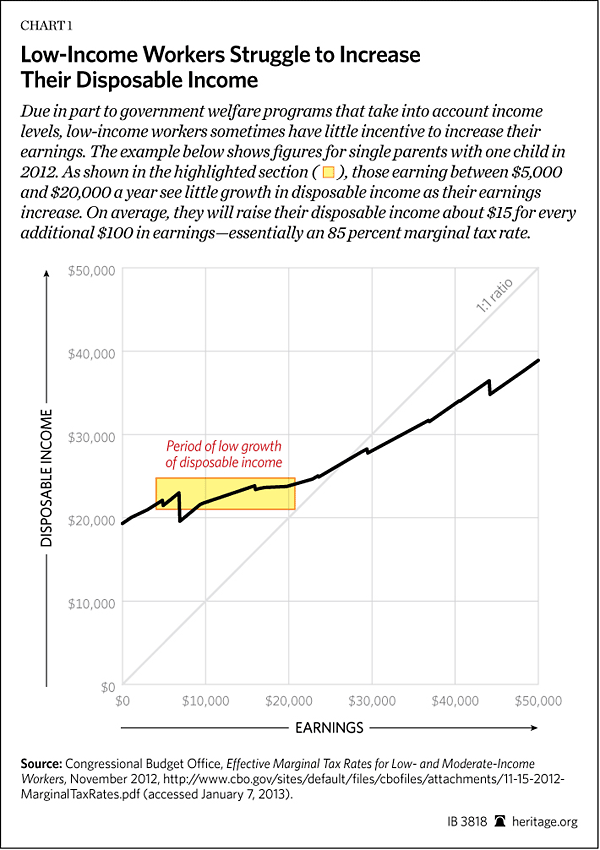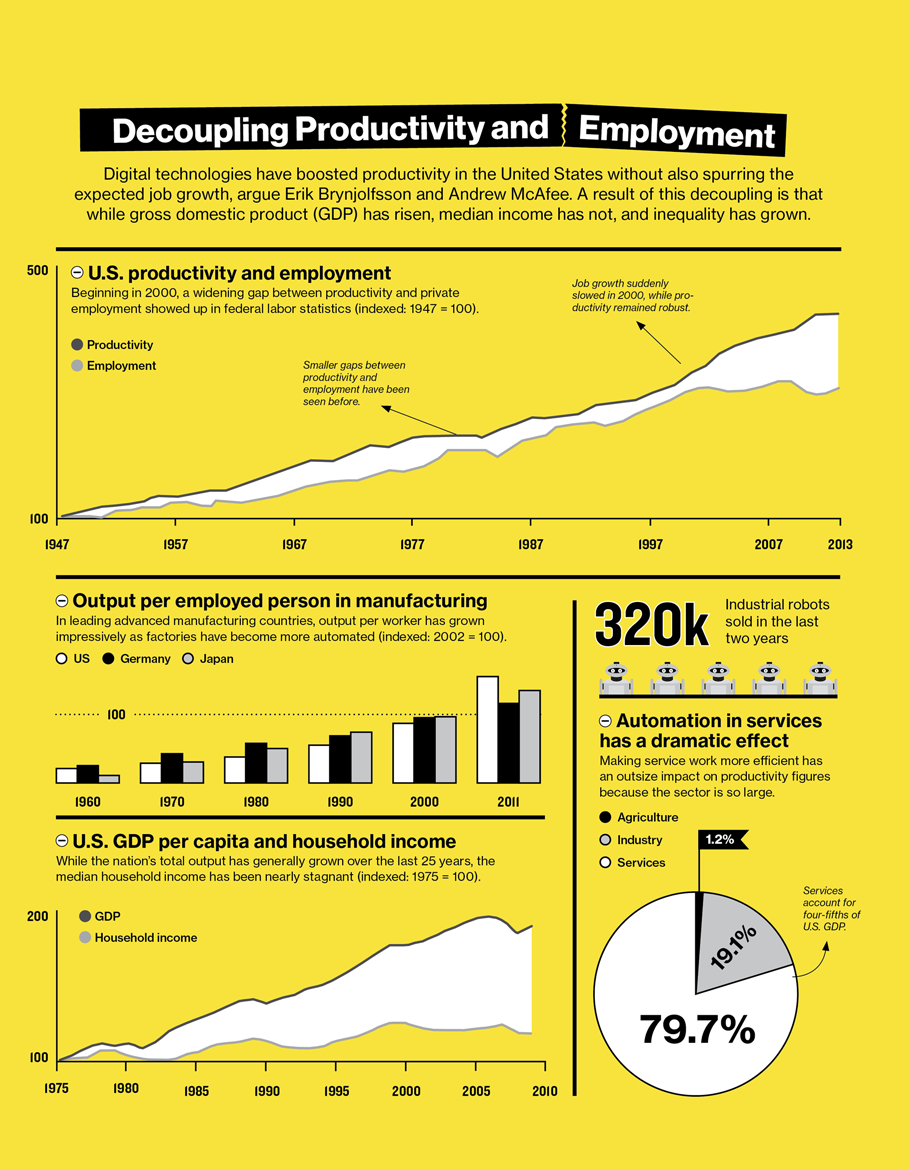Machine Labor Day

Tomorrow’s holiday made possible by eliminating our fears of technological unemployment
The Labor Movement is back.
“Comparing their campaign to the civil rights movement, fast food workers from across the country voted Saturday to escalate their efforts for $15-an-hour pay and union membership by using nonviolent civil disobedience.” — Associated Press

Meanwhile, this appeared as a warning on a billboard in San Francisco:
“San Francisco, Meet your minimum wage replacement (photo depicts a tablet computer). With a new $15 minimum wage, employees will be replaced by less costly, automated alternatives.”
Now imagine the year is 1863 and Abraham Lincoln has just begun giving a slightly different Emancipation Proclamation:
“In the year of our Lord one thousand eight hundred and sixty-three, all persons held as slaves shall be then, thenceforward, and forever guaranteed a MINIMUM WAGE for their forced labor; and the Executive Government of the United States, including the military and naval authority thereof, will recognize and maintain the right of such persons to UNION MEMBERSHIP OVER REPLACEMENT BY MACHINE, and will do no act or acts to repress such persons, or any of them, in any efforts they may make for BETTER PAY AND WORKING CONDITIONS.”
This may look absurd, and rightly so. The idea that people should be forced to sell their labor at the threat of being replaced by robots, and in response call for the right to better pay instead of the right to be replaced by said robots is kind of absurd, isn’t it? Because, what exactly are robots for anyway?
Technological advancement is the boon of human progress, not its bane. Whereas once over 90% of human labor was dedicated to agriculture, in the U.S. it is now 1.1%. What if we had looked at the tractor in fear of it reducing the need for our labor? Where would we be now?
We must not be fooled however into thinking that just as agricultural labor moved to manufacturing, and manufacturing is moving to service industry labor, that service industry labor will be safe or move to something else again entirely. For this is no longer about tractors replacing human horsepower, but hardware and software replacing human brainpower.
Technological Unemployment
The potential for humans to become this century’s horses is real, inferior in almost every way for the jobs once best suited for us. More and more jobs will become more cheaply, efficiently, and just plain better done by machines. We have already reached this point for certain jobs, and this trend will only accelerate because that is the nature of technology — exponential growth. As evidence of this, I give you CGP Grey’s recent 15-minute mini-documentary, “Humans Need Not Apply.”
Still believe there is nothing to worry about and everything will be okay?
We need to understand and comprehend this ongoing replacement of human labor. It will not be stopped, nor should it. Humans need to sleep. Humans need to eat. Humans are slow. Humans make mistakes. Humans get bored. Humans take time to learn. Humans require wages and salaries… and that right there is the biggest issue of all.
There are already instances where it costs more to pay a human than to buy a machine or make use of an app. This point is even being reached in places of exceedingly cheap human labor like China, where even Chinese workers are now being replaced. However, instead of openly embracing this accelerating automation, wage laborers tend to fight against advancing technology for fear of losing jobs, because again, humans are the ones who need wages and salaries, not machines.
There already exists a hamburger making machine that can purportedly make higher quality hamburgers perfect every time, and far faster. But where are the fast food employees picketing to be replaced by this machine so they don’t have to make burgers themselves anymore? Applebee’s recently introduced table ordering via tablet computers and yet pledged not to in any way reduce their staff, citing “It’s not about saving labor.”

Why not? Shouldn’t saving labor be technology’s entire focus? It certainly seems so, but we would all rather eat than watch robots do our work for us as we starve. But we could eat and watch robots do our work for us as we thrive. By forcing the false choice between the two instead of embracing both, we push against human progress, just as if we had pushed against tractors on farms.
A large increase in the federal minimum wage would mostly only help those at the very bottom of the labor market, leaving out in large part the great majority above the very bottom and all the unemployed denied access to the labor market entirely. Meanwhile, the increase in mandatory labor costs would only serve to increase automation in a way that only increases inequality. Owners of capital would come to own more capital, and those without capital would find it even harder to sell their labor at all.
Another group of workers a minimum wage does little to help are those increasingly employed within the “gig economy”, where people aren’t actually employees for companies like Uber and Lyft or TaskRabbit and Fiverr. Instead they are just earning microwages as independent contractors precariously gaining $10 here and $5 there from gig to gig, with nothing remotely close to being definable as job security. These are people who labor economist and co-founder of BIEN, Guy Standing has dubbed the “precariat” — the growing class of people who live day to day, never knowing if they will be able to earn enough to meet their needs.
To put it simply…
A higher minimum wage is a 20th century solution to a 21st century problem.
So what exactly should service industry workers, gig economy workers, and every other kind of worker be fighting for on Labor Day in the 21st century in a world of advancing technological unemployment and increasing financial instability?
The right to say “No” to involuntary labor and “Yes” to machine labor.
The Basic Income Guarantee
You may have heard of something being discussed more and more frequently. Its name is basic income. It goes by other names as well — names like a negative income tax or a citizen’s dividend. It could also be called the Individual Opportunity Grant, or simply a universal income floor. The name however does not matter so much as the idea, and the idea is simple.
Every citizen should be freed from involuntary labor by leveraging our massive gains in productivity via technology to universally supply every citizen the means to unconditionally meet their most basic needs. Then, and only then, would selling one’s labor to others in the labor market become fully voluntary and all laborers finally welcome the loss of their jobs to advancing technology.
We must as free men and women avoid then suggesting no one would choose to work at all if we weren’t forced to work for others. If we look back at the writings of the 19th century, we will find there as well, this notion that slaves had no work ethic and needed to be forced to work lest they suffer from the ills of not working. This doctrine that forced labor saves us from ourselves needs to be relegated to history’s appropriate dustbin.
We need only look around us at all the work being done for free, to see that people do choose to work even when not forced to work. Just look at open collaboration accomplishments like Wikipedia and Creative Commons. Look at open source achievements like GNU/Linux and its derivative Android. Look at all of the volunteers in our local communities (every month nearly 2 million volunteers dedicate more than 8.4 million hours of their time to hunger relief alone), or even within our own homes at the unpaid parental labor that raised us. Unpaid labor is everywhere.

It’s important to also not look at the flawed welfare system that exists today and see it as evidence that people won’t work without force. Our current system creates welfare traps where the removal of benefits as income rises results in little to no net gain. Would you work if you were living in poverty and a minimum wage job meant keeping fifteen cents for every dollar gained through your efforts? It is exactly this trap we need to remove by not clawing money back from people who are seen as no longer needing it badly enough.
People work. People will always work. Even when half of our jobs have been entirely replaced by hardware and software at some point in the next 20 years, people will continue to work. The work will just be different and not necessarily involve monetary exchanges. We need not require anyone be involuntarily forced to work for work to be done.

Perhaps you are now thinking this all makes sense, but where will the money come from? It will simply come from the share of productivity gains made possible by technology that should already be shared. Meanwhile, as automation continues, this surplus will only continue to increase. The argument can even be made that an unconditional basic income will actually save us money.
Perhaps you are now thinking this all makes even more sense, but what of the jobs no one likes that need to be done, and can’t yet be done by robots? What about them? Unattractive jobs people don’t want to take, can and will always be made to become attractive by paying people enough for them to choose to do them voluntarily. There exists no job that won’t be done for the right price.
So, for everyone with a job and everyone seeking one, as we today celebrate Labor Day and look forward to a growing new Labor Movement resurgence, instead of a higher mandated wage for an hour’s labor, let us all consider the alternative idea of fully voluntary labor and the ability to just walk away from jobs offering low pay and poor working conditions. Let us put aside notions that the other side must by definition always be wrong, and consider both the “conservative” idea that no one should be forced to pay another a minimum wage, and the “liberal” idea that no one should be forced to accept an unlivable minimum wage.
Wage labor should be based entirely on free choice, but free choice should be fully free. To realistically achieve this freedom of choice, we must achieve the ability of people to have the voluntary choice of not working. If people can’t say “No”, they are effectively wage slaves with no real choice. As part of enabling this actual choice, we should also all have the freedom to be replaced without fear by cheaper and better technological alternatives. Actually creating these choices will require nothing less than a sufficiently high level of income separate from wage and salary incomes. Without this, we will continue to push against machines, and continue to look for our very survival toward jobs instead of our freedom from them.
Is that really what we want?
This is the age of technological emancipation from labor itself.
We made it.
We’re here.
We need only actually embrace it.
Without a basic income, today we celebrate Human Labor Day.
With a basic income, tomorrow we celebrate Machine Labor Day.
Special thanks to Steven Grimm, Arjun Banker, Topher Hunt, Stern Andrew, Keith Davis, Mark Witham, Albert Wenger, Larry Cohen, Joshua Grant, Chris Smothers, Danielle Texeira, Paul Wicks, Liane Gale, Jan Smole, Joe Esposito, Jack Wagner, Richard Just, Stuart Matthews, Natalie Foster, Chris McCoy, Michael Honey, Daniel Brockman, Gary Aranovich, Kai Wong, Peter Titus, Robby Olivam, John David Hodge, Louise Whitmore, Dan O’Sullivan, Robert F. Greene, Martin Jordo, Victor Lau, Shane Gordon, Paolo Narciso, Johan Grahn, Tony DeStefano, Andrew Henderson, Erhan Altay, Bryan Herdliska, Stephane Boisvert, Rise & Shine PAC, Kirk Israel, Luke Sampson, Lee Irving, Dave Shelton, Bryan Herdliska, Amy Shaffer, Tod Backe, all my other funders for their support, and my amazing partner, Katie Smith.
Would you like to see your name here too?

Did you enjoy reading this? Please click the subscribe button and also consider making a monthly pledge in support of my daily advocacy of basic income for all.
_large.jpg)
UBI Guide Newsletter
Join the newsletter to receive the latest updates in your inbox.



